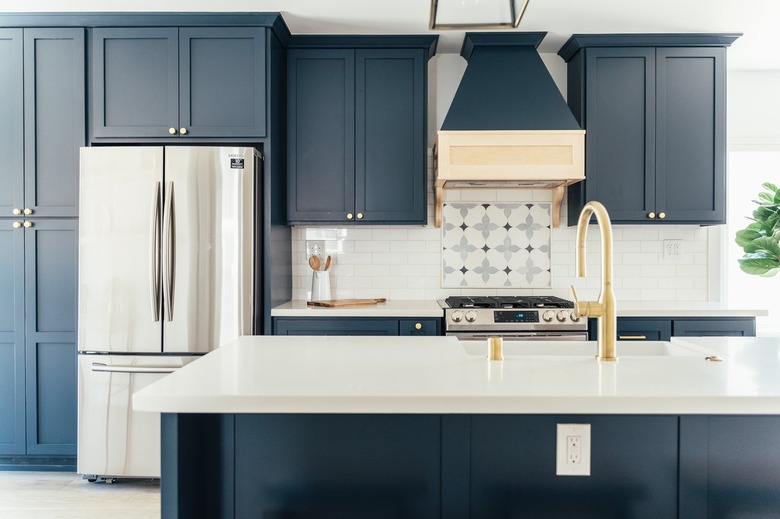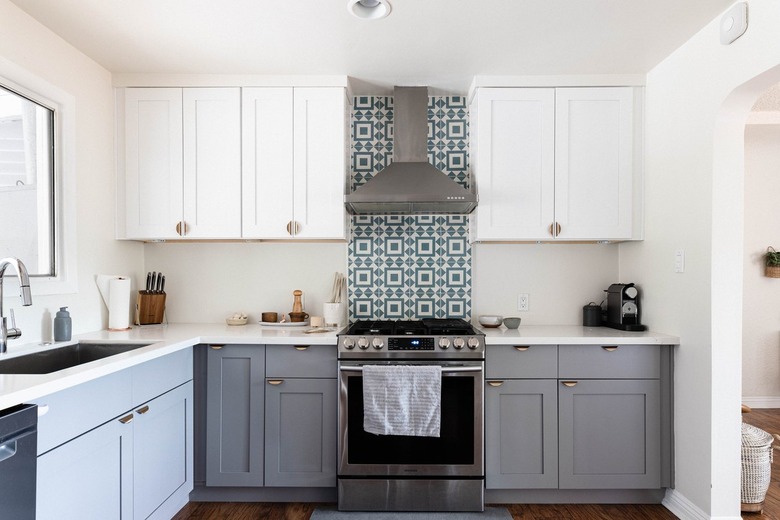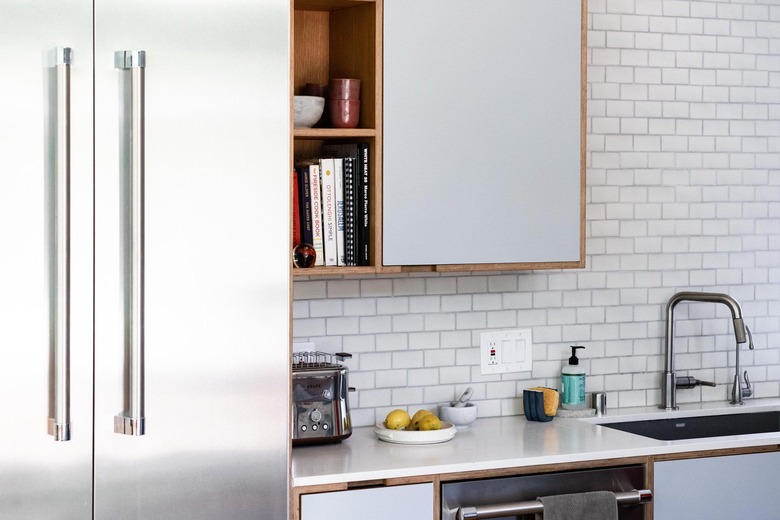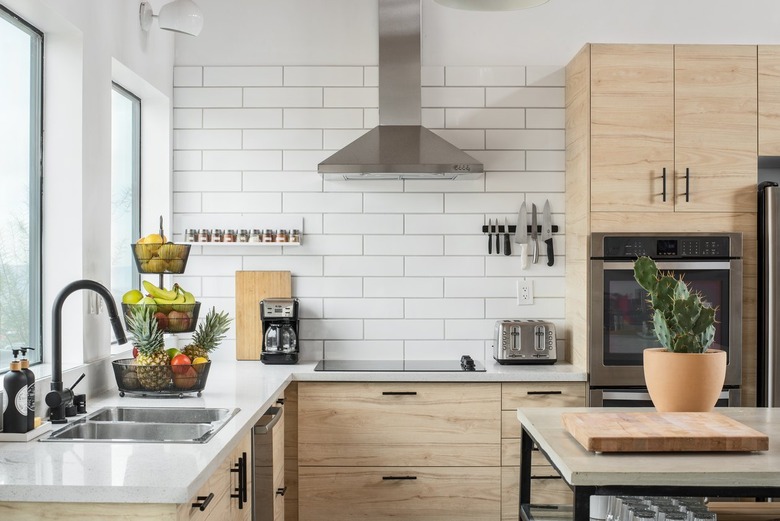Engineered Stone Countertops: Here's Everything You Need To Know
When interior designers and architects talk about engineered stone countertops, more often than not they are referring to the stone-like material produced by mixing crushed natural quartz with colorants and polyester resin in a proportion of about 97% quartz to 3% resin. The result can simulate natural stone slabs or they can present their own distinctive character. Since this countertop material is predominantly quartz, it's also commonly referred to as quartz. But before you commit to engineered stone countertops for your kitchen remodel, here's everything you need to know.
What is engineered stone?
What is engineered stone?
As its name suggests, engineered stone is designed to overcome some of the natural stone's shortcomings. Many popular brands of the engineered variety combine a large proportion of crushed stone and quartz crystals with a binder of polyester resin. This makeup results in a surface that is essentially as hard as stone but less prone to chips and cracks.
Although it's the most common, quartz isn't the only natural material that's used in engineered stone. Granite and marble can also be found in various formulas. When crushed marble is combined with resin, it's generally called cultured marble. But it's softer than quartz and easier to scratch. Consequently, it requires special care. Read our cultured marble versus quartz guide for more info.
What can engineered stone be used for?
What can engineered stone be used for?
While it can certainly work for kitchen countertops, engineered stone is also used to manufacture tile for backsplashes and flooring. Sometimes referred to as agglomerated stone tile, the two most common types combine polyester sealant with either crushed granite or crushed marble. There are differences, though. Marble is softer than granite, and the resulting tile tends to show wear more quickly. On the other hand, when it is worn, marble-based tile is easier to refinish than the granite-bearing option. Both types of agglomerated stone require special care. Because the polyester resin binder is susceptible to degradation from ultraviolet light, it is not considered suitable for exterior use.
A newer form of engineered stone tile combines the toughness and durability of ceramic with the softness and warmth of vinyl. Composed of roughly 30% vinyl and 70% ceramic and produced as individual tiles, it comes in a variety of shapes, colors, and designs. In a departure from vinyl, it's grouted like traditional stone. Popular brands include Armstrong Alterna and Congoleum Duroceramic.
Factors Influencing the Cost of Engineered Stone Countertops
Factors Influencing the Cost of Engineered Stone Countertops
While engineered stone countertops are not the most high-end option on the market, they do provide homeowners with the best of both worlds: functionality and good looks. But let's get down to brass tacks. How much do they cost? In general, you can expect the material to range between $50 and $100 per square foot, but the final price tag depends on a variety of factors.
First of all, the cost of engineered stone depends on the grade, which is a reflection of the refinement and sophistication of the product's appearance. Quartz countertops are an international material, manufactured in countries around the world, which means that shipping costs, as well as the local cost of labor, can both be determining factors. So it's a good idea to compare the cost of similar-looking countertop options by a variety of different brands.
Since fitting and installing engineered stone countertops is a skilled process and requires special tools and equipment, most quartz countertops need to be installed by a professional. In areas where the cost of living is high, the installation costs are likely to also be comparatively higher.
Of course, the individual details of each kitchen will play a big part in the ultimate cost of the countertops. Edge treatment is one of those considerations. Most of the estimates for quartz countertops will assume a plain, smooth, straight edge known as an eased edge. If you prefer something fancier, a rounded edge — also known as a bullnose — will cost extra and an ogee edge — or "S"-shape — will likely cost even more. Your countertop supplier can advise you on all the possible edge treatments and the effect that will have on the final cost.
Specific countertop layouts will also influence the cost. Where a solid, straight run counter is the least expensive alternative, beveled turns, rounded corners, and cut-outs for sinks all incur additional expenses, which your installer can explain.
Kitchen countertop costs are usually expressed in terms of cost per square foot. When comparing costs between engineered stone countertop brands, be certain to clarify whether the quoted cost is the raw cost for the material or for the installed countertop. If you are considering other countertop options in addition to engineered stone, it's best to compare the installed costs.
As indicated earlier, the cost per square foot of installed engineered stone countertops varies depending on the grade of the material and also by the going rate for installation in a particular region. As you might expect, high cost-of-living areas such as the San Francisco Bay or New York City present some of the highest costs per square foot.
To put the cost of engineered stone countertops in perspective, it might be useful to compare them with other possible countertop choices. Choosing the right option requires balancing material and installation costs against ongoing maintenance requirements and factoring in your personal taste.
Pros of Engineered Stone Countertops
Pros of Engineered Stone Countertops
By design, engineered stone countertops overcome some of the disadvantages of their natural stone counterparts. Where natural stone — usually granite or marble — is porous and must be initially sealed and regularly resealed to prevent staining and mold growth, engineered stone countertops are non-porous and require little special care. Where natural stone exhibits color and pattern variations inherent in a material formed by natural processes, as well as the structural flaws that can accompany those variations, engineered quartz countertops are generally more uniform and consistent.
Engineered stone countertops are essentially maintenance-free. The surface won't stain or absorb liquids, making it impervious to mold, mildew, and bacteria, as well. Pro tip: Although this faux stone is resistant to scratches, a cutting board is nevertheless recommended for food prep.
Cons of Engineered Stone
Cons of Engineered Stone
Given the advantages of engineered stone, you might wonder why anyone would choose to go natural. The answer often depends on aesthetics and personal taste. In fact, some people prefer the patina of real stone. To some, they provide character the faux version lacks.
Additionally, there are a few things to consider in terms of functionality. While engineered stone countertops are considered heat resistant, the resin component is still plastic. That means engineered stone is not as resistant to heat as natural granite or marble. There's also an issue of discoloration, which can happen over time if the material is exposed to high temperatures.
What are the alternatives to engineered stone?
What are the alternatives to engineered stone?
Any discussion of engineered stone would be incomplete without recognizing the other countertop materials that, one way or the other, emulate stone. So before making a final decision, try checking out the kitchen countertop options below.
Solid-Surface Countertops
Unlike engineered stone, solid-surface countertops are composed primarily of very hard, very durable acrylic. Colorants and particulates in the mixture often resemble stone, but these counters are also offered in varying bright, sometimes translucent colors. Like engineered quartz, this material is non-porous and easy to maintain. It's more susceptible to scratching and knife cuts than quartz, but because the color is consistent throughout, damage to the surface can often be sanded and buffed out. These counters are more vulnerable to heat than quartz or stone, so care must be taken to protect against pans and cooking appliances. When properly cared for, solid-surface countertops should be good for 12 to 20 years or more.
Solid-surface technology has also been employed to produce sinks and backsplashes that exactly match the countertops for a seamless integration. Plus, they are available from a number of manufacturers.
Concrete
Although the idea of concrete countertops may sound utilitarian, the material can be starkly beautiful, even elegant. It can also be embedded with stone, glass, shells, or other materials to give it depth and interest. Moreover, you can add pigment to achieve nearly any color you wish.
Like natural stone, concrete countertops must be properly sealed at the beginning and resealed every one to three years. Without this step, the porosity makes it prone to staining. Concrete is, of course, very tough and stands up well to hard use. It won't scratch and is eminently heat resistant.
Unlike engineered stone countertops, concrete is custom cast to fit your specific layout — either in a shop on special casting tables and cured under controlled conditions or formed on-site where it can be precisely fitted from the outset. Despite the relatively low cost of the component materials, because concrete countertops are not mass-produced, they are labor and skill-intensive. They also tend to be as costly as natural or engineered stone.
Recycled Glass
Recycled glass is relatively new as a countertop material. Made from crushed glass combined with resin, the manufacturing process is similar to that of engineered stone. The finished surface is tough and non-porous, resistant to staining and heat, and easy to maintain. Because they incorporate recycled material, glass countertops are environmentally friendly. And the look is incredibly contemporary.
Where to Buy Engineered Stone
Where to Buy Engineered Stone
Popular brands of engineered stone include Silestone, Cambria, Caesarstone, Technistone, and Icestone. All use similar manufacturing technology. However, while this material is made in countries around the world, Italy, Spain, and Israel are often the biggest producers. Cambria is the only brand of engineered stone countertops produced in the United States. Because so much is imported, the availability of particular brands may vary regionally.





